- Home
- H. Beam Piper
Murder in the Gunroom Page 7
Murder in the Gunroom Read online
Page 7
CHAPTER 7
When Walters entered, Rand had his pipe lit and was walking slowly aroundthe room, laying out the work ahead of him. Roughly, the earliest pieceswere on the extreme left, on the short north wall of the room, and themost recent ones on the right, at the south end. This was, of course,only relatively true; the pistols seemed to have been classified by typein vertical rows, and chronologically from top to bottom in each row. Thecollection seemed to consist of a number of intensely specialized smallgroups, with a large number of pistols of general types added. Forinstance, about midway on the long east wall, there were some thirty-oddall-metal pistols, from wheel lock to percussion. There was a collectionof U.S. Martials, with two rows of the regulation pistols, flintlock andpercussion, of foreign governments, placed on the left, and thecollection of Colts on the right. After them came the other types ofpercussion revolvers, and the later metallic-cartridge types.
It was an arrangement which made sense, from the arms student's pointof view, and Rand decided that it would make sense to the dealers andmuseums to whom he intended sending lists. He would save time bylisting them as they were hung on the walls. Then, there were the casesbetween the windows on the west wall, containing the ammunitioncollection--examples of every type of fixed-pistol ammunition--and thecollection of bullet-molds and powder flasks and wheel lock spanners andassorted cleaning and loading accessories. All that stuff would have tobe listed, too.
"I beg your pardon, sir," Walters broke in, behind him. "Mrs. Flemingsaid that you wanted me."
"Oh, yes." Rand turned. "Is this the whole thing? What's on the walls,here?"
"Yes, sir. There is also a wall-case containing a number of modernpistols and revolvers, and several rifles and shotguns, in the roomformerly occupied by Mr. Fleming, but they are not part of thecollection, and they are now the personal property of Mrs. Fleming.I understand that she intends selling at least some of them, on herown account. Then, there is a quantity of ammunition andammunition-components in that closet under the workbench--cartridges,primed cartridge-shells, black and smokeless powder, cartridge-primers,percussion caps--but they are not part of the collection, either. Ibelieve Mrs. Fleming wants to sell most of that, too."
"Well, I'll talk to her about it. I may want to buy some of theammunition for myself," Rand said. "So I only need to bother with what'son the walls, in this room?... By the way, did Mr. Fleming keep any sortof record of his collection? A book, or a card-index, or anything likethat?"
"Why no, sir." Walters was positive. Then he hedged. "If he did, I neversaw or heard of anything of the sort. Mr. Fleming knew everything in thisroom. I've seen him, downstairs, when somebody would ask him aboutsomething, close his eyes as though trying to visualize and then give aperfect description of any pistol in the collection. Or else, he couldenumerate all the pistols of a certain type; say, all the PhiladelphiaDeringers, or all the Allen pepperboxes, or all the rim-fire Smith &Wesson tip-back types. He had a remarkable memory for his pistols,although it was not out of the ordinary otherwise, sir."
Rand nodded. Any collector--at least, any collector who was a seriousarms-student--could do that, particularly if he were a good visualizerand kept his stuff in some systematic order. At the moment, he could havenamed and described any or all of his own modest collection of twohundred-odd pistols and revolvers.
"I was hoping he'd kept a record," he said. "A great many collectors do,and it would have helped me quite a bit." He made up his mind to compilesuch a record, himself, when he got back to New Belfast. It would be abig help to Carter Tipton, when it came time to settle his own estate,and a man on whom the Reaper has scored as many near-misses as on JeffRand should begin to think of such things. "And how about writingmaterials? And is there a typewriter available?"
There was: a cased portable was on the floor beside the workbench.Walters showed him which desk drawers contained paper and other things.There was, Rand noticed, a loaded .38 Colt Detective Special, in theupper right-hand desk drawer.
"And these phones," the butler continued, indicating them. "This one isa private outside phone; it doesn't connect with any other in the house.The other is an extension. It has a buzzer; the outside phone has aregular bell."
Rand thanked him for the information. Then, picking up a note-pad andpencil, he started on the left of the collection, meaning to make ageneral list and rough approximation of value for use in talking toGresham's friends that evening. Tomorrow he would begin on the detailedlist for use in soliciting outside offers.
Twenty-five wheel locks: four heavy South German dags, two singlesand a pair; three Saxon pistols, with sharply dropped grips, a pairand one single; five French and Italian sixteenth-century pistols;a pair of small pocket or sash pistols; a pair of French petronels,and an extremely long seventeenth-century Dutch pistol with anivory-covered stock and a carved ivory Venus-head for a pommel; eightseventeenth-century French, Italian and Flemish pistols. Rand noted themdown, and was about to pass on; then he looked sharply at one of them.
It was nothing out of the ordinary, as wheel locks go; a long Flemishweapon of about 1640, the type used by the Royalist cavalry in theEnglish Civil War. There were two others almost like it, but this one wasin simply appalling condition. The metal was rough with rust, andapparently no attempt had been made to clean it in a couple of centuries.There was a piece cracked out of the fore-end, the ramrod was missing, aswas the front ramrod-thimble, both the trigger-guard and the butt-capwere loose, and when Rand touched the wheel, it revolved freely ifsluggishly, betraying a broken spring or chain.
The vertical row next to it seemed to be all snaphaunces, but among themRand saw a pair of Turkish flintlocks. Not even good Turkish flintlocks;a pair of the sort of weapons hastily thrown together by native craftsmenor imported ready-made from Belgium for bazaar sale to gullible tourists.Among the fine examples of seventeenth-century Brescian gunmaking aboveand below it, these things looked like a pair of Dogpatchers in theWaldorf's Starlight Room. Rand contemplated them with distaste, thenshrugged. After all, they might have had some sentimental significance;say souvenirs of a pleasantly remembered trip to the Levant.
A few rows farther on, among some exceptionally fine flintlocks, allof which pre-dated 1700, he saw one of those big Belgian navy pistols,_circa_ 1800, of the sort once advertised far and wide by a certainold-army-goods dealer for $6.95. This was a particularly repulsivespecimen of its breed; grimy with hardened dust and gummed oil, maculatedwith yellow-surface-rust, the brasswork green with corrosion. It wasimpossible to shrug off a thing like that. From then on, Rand kept hiseyes open for similar incongruities.
They weren't hard to find. There was a big army pistol, of CentralEuropean origin and in abominable condition, among a row of finemulti-shot flintlocks. Multi-shot ... Stephen Gresham had mentioned anElisha Collier flintlock revolver. It wasn't there. It should be hangingabout where this post-Napoleonic German thing was.
There was no Hall breech-loader, either, but there was a dilapidated oldKetland. There were many such interlopers among the U.S. Martials: anEnglish ounce-ball cavalry pistol, a French 1777 and a French 1773, acouple more $6.95 bargain-counter specials, a miserable altered S. North1816. Among the Colts, there was some awful junk, including a big Spanishhinge-frame .44 and a Belgian imitation of a Webley R.I.C. Model. Thereweren't as many Paterson Colts as Gresham had spoken of, and theWhitneyville Walker was absent. It went on like that; about a dozen ofthe best pistols which Rand remembered having seen from two years agowere gone, and he spotted at least twenty items which the late LaneFleming wouldn't have hung in his backyard privy, if he'd had one.
Well, that was to be expected. The way these pistols were arranged, theabsence of one from its hooks would have been instantly obvious. So, asthe good stuff had moved out, these disreputable changelings had movedin.
"You had rather a shocking experience here, in Mr. Fleming's death," Randsaid, over his shoulder, to the butler.
"Oh, yes indeed, sir!" Walters seemed relieved that R
and had broken thesilence. "A great loss to all of us, sir. And so unexpected."
He didn't seem averse to talking about it, and went on at some length.His story closely paralleled that of Gladys Fleming.
"Mr. Varcek called the doctor immediately," he said. "Then Mr. Dunmorepointed out that the doctor would be obliged to notify either the coroneror the police, so he called Mr. Goode, the family solicitor. That wasabout twenty minutes after the shot. Mr. Goode arrived directly; he washere in about ten minutes. I must say, sir, I was glad to see him; totell the truth, I had been afraid that the authorities might claim thatMr. Fleming had shot himself deliberately."
Somebody else doesn't like the smell of that accident, Rand thought.Aloud, he said:
"Mr. Goode lives nearby, then, I take it?"
"Oh, yes, sir. You can see his house from these windows. Over here, sir."
Rand looked out the window. The rain-soaked lawn of the Fleming residenceended about a hundred yards to the west; beyond it, an orchard wasbeginning to break into leaf, and beyond the orchard and another lawnstood a half-timbered Tudor-style house, somewhat smaller than theFleming place. A path led down from it to the orchard, and another ledfrom the orchard to the rear of the house from which Rand looked.
"Must be comforting to know your lawyer's so handy," he commented. "Andwhat do you think, Walters? Are you satisfied, in your own mind, that Mr.Fleming was killed accidentally?"
The servant looked at him seriously. "No, sir; I'm not," he replied."I've thought about it a great deal, since it happened, sir, and I justcan't believe that Mr. Fleming would have that revolver, and startworking on it, without knowing that it was loaded. That just isn'tpossible, if you'll pardon me, sir. And I can't understand how he wouldhave shot himself while removing the charges. The fact is, when I came uphere at quarter of seven, to call him for cocktails, he had the wholething apart and spread out in front of him." The butler thought for amoment. "I believe Mr. Dunmore had something like that in mind when hecalled Mr. Goode."
"Well, what happened?" Rand asked. "Did the coroner or the doctor chokeon calling it an accident?"
"Oh no, sir; there was no trouble of any sort about that. You see, Dr.Yardman called the coroner, as soon as he arrived, but Mr. Goode was herealready. He'd come over by that path you saw, to the rear of the house,and in through the garage, which was open, since Mrs. Dunmore was outwith the coupe. They all talked it over for a while, and the coronerdecided that there would be no need for any inquest, and the doctor wroteout the certificate. That was all there was to it."
Rand looked at the section of pistol-rack devoted to Colts.
"Which one was it?" he asked.
"Oh it's not here, sir," Walters replied. "The coroner took it away withhim."
"And hasn't returned it yet? Well, he has no business keeping it. It'spart of the collection, and belongs to the estate."
"Yes, sir. If I may say so, I thought it was a bit high-handed of him,taking it away, myself, but it wasn't my place to say anything about it."
"Well, I'll make it mine. If that revolver's what I'm told it is, it'stoo valuable to let some damned county-seat politician walk off with." Athought occurred to him. "And if I find that he's disposed of it, thiscounty's going to need a new coroner, at least till the present incumbentgets out of jail."
The buzzer of the extension phone went off like an annoyed rattlesnake.Walters scooped it up, spoke into it, listened for a moment, and handedit to Rand.
"For you, sir; Mrs. Fleming."
"Colonel Rand, Carl Gwinnett, the commission-dealer I told you about ishere," Gladys told him. "Do you want to talk to him?"
"Why, yes. Do I understand, now, that you and the other ladies want cash,and don't want the collection peddled off piecemeal?... All right, sendhim up. I'll talk to him."
A few minutes later, a short, compact-looking man of forty-odd enteredthe gunroom, shifting a brief case to his left hand and extending hisright. Rand advanced to meet him and shook hands with him.
"You're Colonel Rand? Enjoyed your articles in the _Rifleman_," he said."Mrs. Fleming tells me you're handling the sale of the collection for theestate."
"That's right, Mr. Gwinnett. Mrs. Fleming tells me you're interested."
"Yes. Originally, I offered to sell the collection for her on acommission basis, but she didn't seem to care for the idea, and neitherdo the other ladies. They all want spot cash, in a lump sum."
"Yes. Mrs. Fleming herself might have been interested in yourproposition, if she'd been sole owner. You could probably get more forthe collection, even after deducting your commission, than I'll be ableto, but the collection belongs to the estate, and has to be sold beforeany division can be made."
"Yes, I see that. Well, how much would the estate, or you, consider areasonable offer?"
"Sit down, Mr. Gwinnett," Rand invited. "What would you consider areasonable offer, yourself? We're not asking any specific price; we'rejust taking bids, as it were."
"Well, how much have you been offered, to date?"
"Well, we haven't heard from everybody. In fact, we haven't put out alist, or solicited offers, except locally, as yet. But one gentleman hasexpressed a willingness to pay up to twenty-five thousand dollars."
Gwinnett's face expressed polite skepticism. "Colonel Rand!" heprotested. "You certainly don't take an offer like that seriously?"
"I think it was made seriously," Rand replied. "A respectable profitcould be made on the collection, even at that price."
Gwinnett's eyes shifted over the rows of horizontal barrels on the walls.He was almost visibly wrestling with mental arithmetic, and at the sametime trying to keep any hint of his notion of the collection's real valueout of his face.
"Well, I doubt if I could raise that much," he said. "Might I ask who'smaking this offer?"
"You might; I'm afraid I couldn't tell you. You wouldn't want me topublish your own offer broadcast, would you?"
"I think I can guess. If I'm right, don't hold your head in a tub ofwater till you get it," Gwinnett advised. "Making a big offer to scareaway competition is one thing, and paying off on it is another. I've seenthat happen before, you know. Fact is, there's one dealer, not far fromhere, who makes a regular habit of it. He'll make some fantastic offer,and then, when everybody's been bluffed out, he'll start makingobjections and finding faults, and before long he'll be down to abouta quarter of his original price."
"The practice isn't unknown," Rand admitted.
"I'll bet you don't have this twenty-five thousand dollar offer on paper,over a signature," Gwinnett pursued. "Well, here." He opened his briefcase and extracted a sheet of paper, handing it to Rand. "You can filethis; I'll stand back of it."
Rand looked at the typed and signed statement to the effect that CarlGwinnett agreed to pay the sum of fifteen thousand dollars for the LaneFleming pistol-collection, in its entirety, within thirty days of date.That was an average of six dollars a pistol. There had been a time, nottoo long ago, when a pistol-collection with an average value of sixdollars, particularly one as large as the Fleming collection, had beensomething unusual. For one thing, arms values had increased sharply inthe meantime. For another, Lane Fleming had kept his collection clean ofthe two-dollar items which dragged down so many collectors' averagevalues. Except for the two-dozen-odd mysterious interlopers, there wasn'ta pistol in the Fleming collection that wasn't worth at least twentydollars, and quite a few had values expressible in three figures.
"Well, your offer is duly received and filed, Mr. Gwinnett," Rand toldhim, folding the sheet and putting it in his pocket. "This is betterthan an unwitnessed verbal statement that somebody is willing to paytwenty-five thousand. I'll certainly bear you in mind."
"You can show that to Arnold Rivers, if you want to," Gwinnett said. "Seehow much he's willing to commit himself to, over his signature."

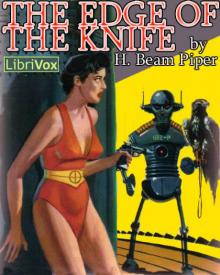 The Edge of the Knife
The Edge of the Knife Genesis
Genesis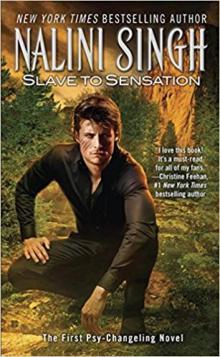 A Slave is a Slave
A Slave is a Slave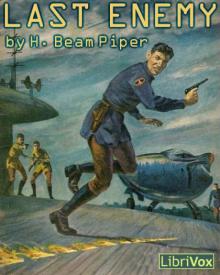 Last Enemy
Last Enemy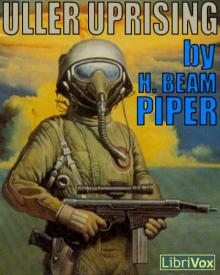 Uller Uprising
Uller Uprising Ministry of Disturbance
Ministry of Disturbance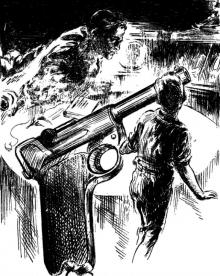 Time and Time Again
Time and Time Again The Mercenaries
The Mercenaries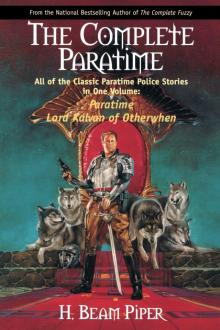 Police Operation
Police Operation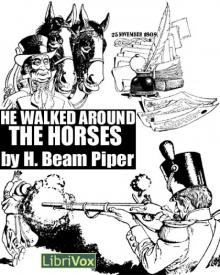 He Walked Around the Horses
He Walked Around the Horses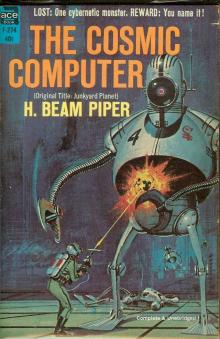 Time Crime
Time Crime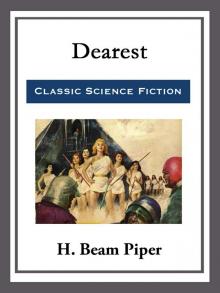 Dearest
Dearest Day of the Moron
Day of the Moron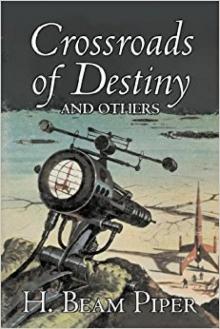 Crossroads of Destiny
Crossroads of Destiny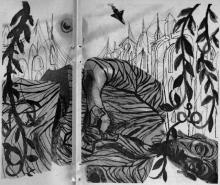 Graveyard of Dreams
Graveyard of Dreams The Cosmic Computer
The Cosmic Computer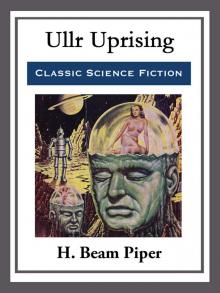 Ullr Uprising
Ullr Uprising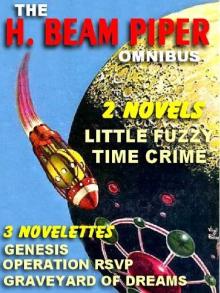 Operation R.S.V.P.
Operation R.S.V.P.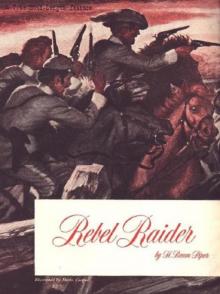 Rebel Raider
Rebel Raider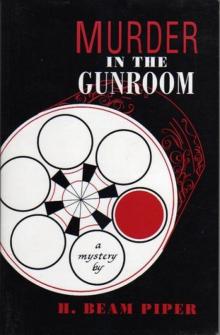 Murder in the Gunroom
Murder in the Gunroom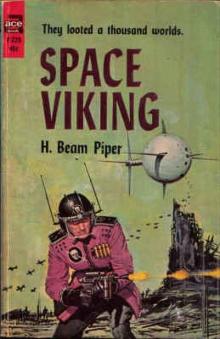 Space Viking
Space Viking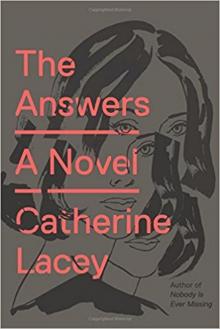 The Answer
The Answer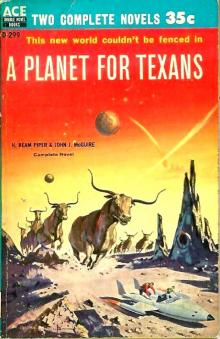 A Planet for Texans (aka Lone Star Planet)
A Planet for Texans (aka Lone Star Planet)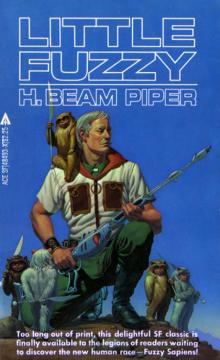 Little Fuzzy
Little Fuzzy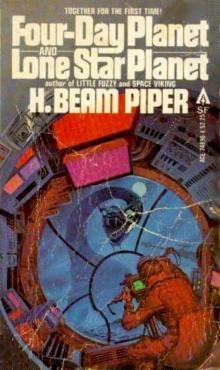 Four-Day Planet
Four-Day Planet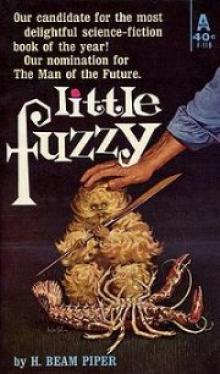 Little Fuzzy f-1
Little Fuzzy f-1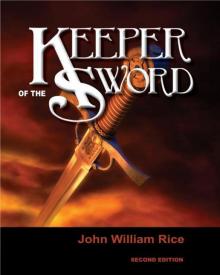 Keeper
Keeper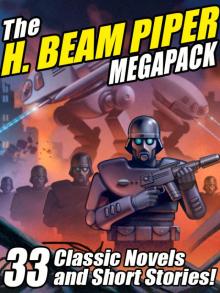 The H. Beam Piper Megapack
The H. Beam Piper Megapack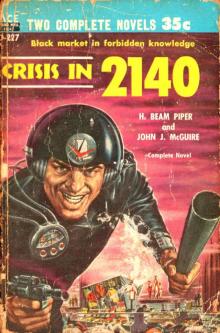 H. Beam Piper
H. Beam Piper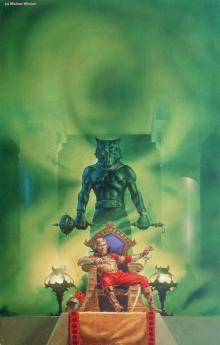 Lord Kalvan of Otherwhen
Lord Kalvan of Otherwhen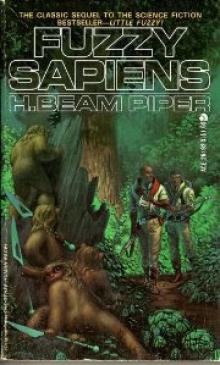 Fuzzy Sapiens f-2
Fuzzy Sapiens f-2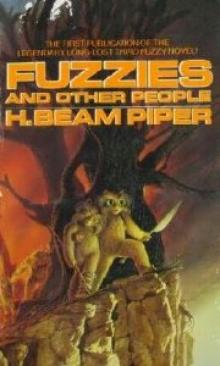 Fuzzies and Other People f-3
Fuzzies and Other People f-3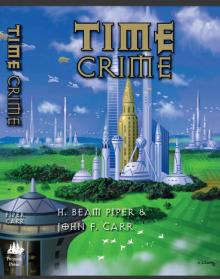 TIME PRIME
TIME PRIME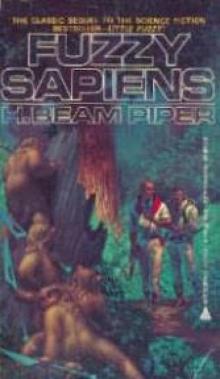 Fuzzy Sapiens
Fuzzy Sapiens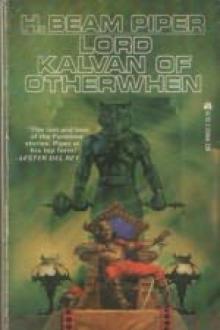 Lord Kalvan of Otherwhen k-1
Lord Kalvan of Otherwhen k-1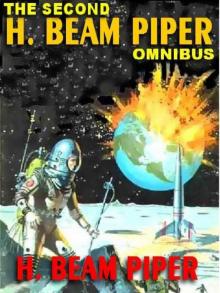 The Second H. Beam Piper Omnibus
The Second H. Beam Piper Omnibus